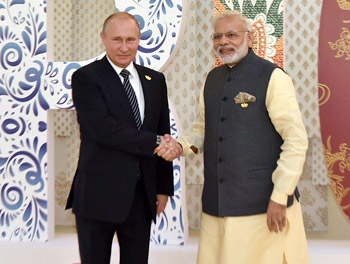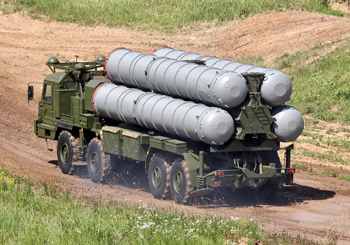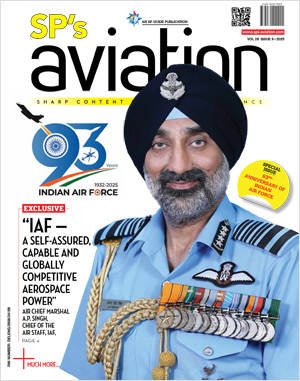INDIAN ARMED FORCES CHIEFS ON OUR RELENTLESS AND FOCUSED PUBLISHING EFFORTS

The insightful articles, inspiring narrations and analytical perspectives presented by the Editorial Team, establish an alluring connect with the reader. My compliments and best wishes to SP Guide Publications.

"Over the past 60 years, the growth of SP Guide Publications has mirrored the rising stature of Indian Navy. Its well-researched and informative magazines on Defence and Aerospace sector have served to shape an educated opinion of our military personnel, policy makers and the public alike. I wish SP's Publication team continued success, fair winds and following seas in all future endeavour!"

Since, its inception in 1964, SP Guide Publications has consistently demonstrated commitment to high-quality journalism in the aerospace and defence sectors, earning a well-deserved reputation as Asia's largest media house in this domain. I wish SP Guide Publications continued success in its pursuit of excellence.
- Rajnath Singh assumes charge as Defence Minister for the second consecutive term
- Interim Defence Budget 2024-25 — An Analysis
- Union Defence budget 2024
- Prime Minister Modi Flies in the LCA Tejas
- New Chapter in India-Italy Defence Ties
- Airpower beyond Boundaries
- Full address by Air Chief Marshal V.R. Chaudhari, Chief of the Air Staff
Goa Takeaway: India-Russia mega defence deals


Despite India’s strengthening of defence and other ties with the US and Russia’s recent overtures in Pakistan, the relationship between India and Russia has a historic bonding. The Prime Minister Mr. Narendra Modi termed Russia as an ‘old friend’. He went further and said “An old friend is better than two new friends”, highlighting the “special and privileged strategic partnership” between India and Russia. This was reconfirmed in Benaulim, Goa at the BRICS summit where India and Russia inked big-ticket defence deals which signal that lasting relationship.
Advanced anti-aircraft defence system
The Prime Minister Mr. Modi and Russian President, Mr. Vladimir Putin, both have been storming the global centre-stage with their leadership, witnessed the signing of a Rs. 39,000 crore defence deal to procure Russia’s most advanced anti-aircraft defence system, the S400 Triumf which is expected to provide India a solid ballistic missile shield. The S-400 Triumf, previously known as S-300PMU-3, is an anti-aircraft weapon system developed by Russia’s Almaz Central Design Bureau in the 1990s as an ugrade of the S-300 family. It has been in service with the Russian Armed Forces since 2007. The S-400 uses three different missiles to cover its entire performance envelope. These are the extremely long range 40N6, long range 48N6 and medium range 9M96 missile.


Kamov helicopters
The second deal related to India’s import and subsequent manufacture of the Russian Kamov Ka-226 T light utility helicopters. The subsequent manufacture of the helicopters in India will give a major boost to the defence industrial base in India which the Narendra Modi government is aggressively pitching for. The two countries will also collaborate in making four state of the art Admiral Grigorovich-class (Project 11356) guided-missile stealth frigates. Taking the defence relationship further, both India and Russia agreed to conduct an annual military conference, an engagement which would go a long way in understanding each other militarily.
Prime Minister Mr. Modi tweeted “My talks with President Putin lay the foundations for deeper defence and economic ties between India and Russia.” He further mentioned the ‘highly productive’ outcomes of the meeting which clearly established the special and privileged nature of strategic partnership between the two countries. "They also lay the foundations for deeper defence and economic ties in years ahead. The agreements on manufacturing of Kamov 226T helicopters; constructions of frigates; and acquisition and building of other defence platforms are in synergy with India's technology and security priorities."
Cross-border terrorism
Prime Minister Modi acknowledged President Putin’s condemnation message on cross-border terrorism. “Russia’s clear stand on need to combat terrorism mirrors our own. We deeply appreciate Russia’s understanding and support of our actions to fight cross border terrorism that threatens our entire region. We both affirmed the need for zero tolerance in dealing with terrorists and their supporters,” the Prime Minister said at a joint media event the Russian President Vladimir Putin.
Nevertheless niggling doubts remain in the ever dynamic region. The Russian position on cross-border terrorism is extremely significant as it comes soon after the joint military exercise Pakistan and Russia have had in September. “Russia will never do anything that is not in the interest of our welfare. Russia understands India’s interest and will never do anything which is contrary to India’s interest,” Foreign Secretary S. Jaishankar said after the press meet. ''Terrorism is a global issue. The [country that is the] epicentre of terrorism is near India. But the actions of that country [Pakistan] is having global impacts. We agreed on the need to have an international legal framework on terrorism and better border management” said Mr. Jaishankar.
The highpoint of the BRICS meeting was also to reiterate how Pakistan is behaving as a rogue state. It was made clear that in South Asia and BIMSTEC (Bengal initiative for multi-sectoral, technical and economic cooperation), all nation states barring one, are motivated to pursue a path of peace for its people, but for Pakistan ‘terrorism has become its favourite child, and the child in turn has come to define the essential character and nature of its parent’.
Prime Minister Modi appreciated Russia's understanding and support of India's actions to fight cross-border terrorism, an oblique reference to India's surgical strike across the Line of Control (LoC) last month targeting terror launch pads in PoK.
"Russia's clear stand on the need to combat terrorism mirrors our own. We deeply appreciate Russia's understanding and support of our actions to fight cross-border terrorism that threatens our entire region. "We both affirmed the need for zero tolerance in dealing with terrorists and their supporters," Prime Minister Modi said.
Agreement on information security
The two countries also signed an agreement on “information security” to fight online security threats. Mr. Putin highlighted Russia’s “stable” approach to ties with India. He said his government would ensure steady energy cooperation with India to support the expanding Indian economy. “Sometimes differences appear in some projects over a period due to currency devaluation. But we commit to maintain a steady approach to bilateral projects with India,” said Mr. Putin adding, “we are also working on joint development of Sukhoi super jets and passenger aircraft.”
India is the world's top defence importer and is undergoing a $100-billion upgrade of its mostly Soviet-era military equipment. India was the erstwhile Soviet Union's closest military ally during the Cold War and a major importer of its military hardware. But in recent years Delhi has turned to the United States for supplies, as the two nations forge stronger ties. In fact, India has opened up a slew of defence opportunities not just with one country but multiple, thus reducing the risk of ‘one-basket’ theory.





